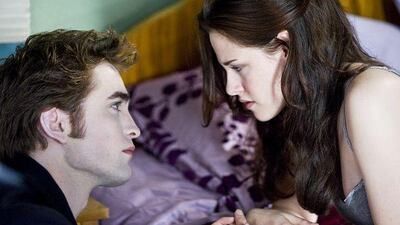@AL-ReviewBody:The Twilight Saga: New Moon Director: Chris Weitz Starring: Robert Pattinson, Kristen Stewart, Taylor Lautner You might almost miss the pivotal point in The Twilight Saga: New Moon. Midway through the movie, the heroine Bella (Kristen Stewart) and her sometime school friend Jessica (Anna Kendrick) emerge from a movie theatre in their small town of Forks, Washington, and scoff at the quality of the film they've just seen.
"It's a zombie movie," sighs Jennifer, before adding with a sneer, "but it's supposed to be a metaphor for consumerism!?" By articulating the charge against this film within a film - that it is over-burdened with self-conscious metaphor - Jennifer also lays the groundwork for an ironic defence of New Moon itself. Few films in the history of the medium have been so concerned with metaphor and allegory (often at the expense of drama) as this strangely anodyne adaptation.
The metaphor here, as it is in the entire best-selling, four-part book series that inspires it, is one of abstinence. The Twilight series was written by the 35-year-old Mormon Stephenie Meyer, and has become a global phenomenon (the first book has sold more than 17 million copies and been translated into 37 languages) precisely because it is constructed around the never-ending romantic tension between its two teenage protagonists.
The metaphor that fuels the tension is vampirism. Edward Cullen (Robert Pattinson) is a 108-year-old vampire trapped in the body of a 17-year-old Forks High School student who falls passionately in love with his classmate Bella Swan. Edward and Bella share a couple of extremely chaste kisses, but whenever they feel their passions overtaking them they must fling themselves away from each other lest Edward succumb to his primal vampiric nature and fatally attack Bella.
The premise sustained the entire first movie in the saga, Twilight, which last year scooped $384 million (Dh1.4 billion) at the global box office and proved a quietly kitsch pleasure. However, the sight of two teen paramours, one year on, being prized apart by the contrivance of metaphor and narrative chicanery is beginning to wear thin. In New Moon, Edward decides Bella will only be free from danger if he leaves the country. The first act is barely done before he flees to foreign parts, eventually resurfacing in Italy for a wearisome, final-act climax involving a preposterous bunch of Renaissance-era vampires.
In the meantime, Bella becomes close - platonically at first, but then quasi-romantically - to the family friend and local beefcake Jacob (Taylor Lautner). Here again, the story is thrust into metaphor. Jacob, it quickly transpires, can never be close to Bella because he is - yes - a werewolf. There is a chance that Jacob might maul her to pieces. Just like Edward. In moments like these, especially when Jacob reveals his werewolf nature to Bella (he bursts out of his clothes while transforming, in a flash of CGI histrionics, into a giant grey wolf), the movie cries out for some self-deprecating levity, or at least a witty comment from someone. Anyone! Instead, it is all played with agonisingly straight faces. When Jacob eventually faces Bella with the heart-felt cri de coeur, which Lautner delivers with soap-opera intensity - "It's not a lifestyle choice, Bella! I was born this way!" - you really don't know where to look.
The movie, which claims to take some structural nods from Romeo and Juliet, ends with an idiotic resolution in rural Italy. The lack of narrative sense is almost as galling as the lack of invention. Of course, the movie will be a huge smash, and the teenage target audience will no doubt thrill at the sight of wooden performances, leaden direction and a damp-squib visual aesthetic as long as they serve the romantic stasis of Bella and Edward. And maybe that's the point of Twilight: that nothing happens. That romance is never gratified. That everything remains idealistically and perfectly possible.

